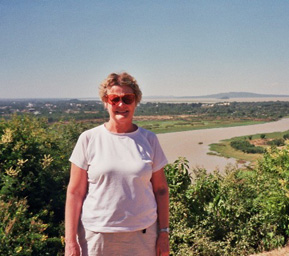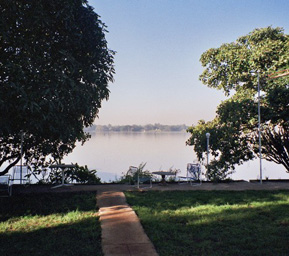| |
 |
Remembering Ethiopia
By Carol Beddo
Once again I stand on Lake Tana’s
southern shore and feel the pushing breeze
that begins every afternoon at precisely one
o’clock. Listening to the bird chorus in
these trees, I recall the gentle, musical
rhythm of the Ethiopian countryside in the
mid-60s, when I lived and taught in Bahar
Dar for two years.
Even though Bahar Dar has been transformed
from country village to planned city,
the morning sounds of the
countryside can still be
heard near the lake and on
the city outskirts. With the
first direct rays of sunlight,
a choir of East African birds
perches in the tops of fragrant
eucalyptus saplings.
While birds scream out individual
choruses in an undirected
symphony, donkeys
bray the day a hoarse welcome.
When I lived here, this
riot was punctuated by gray
doves perched on the handhewn
timber eaves just outside
my bedroom, their regular
morning performance a
steady alto he-hoo-hooo hehoo-
hooo.
Outside of the city, nervous noises of
industrious neighborhood chickens compete
with the bird choir. Hens, chicks and
roosters, all busily clucking or crowing,
scratch and peck at moist, red dirt under
short grasses at the edges of a dirt footpath.
Barefoot steps of men and boys thud almost
silently as they trot alongside livestock. Soft
earth on morning-moist paths muffles
hooves’ quick drumbeats. Men gently guide
cattle, sheep and goats with dula, mumbling
commands while herding them to the lake
for morning water.
I first stood here forty years ago, behind
the even-then old Ghion Hotel, at this
same fig tree and let the freshwater wind
clear my head of Ethiopia’s exotic, distinctive aroma. It felt like homecoming when I
arrived in Addis Ababa three weeks ago,
when I was embraced by the heart notes of
Ethiopia’s amazing perfume offered warm
welcome. But here, in Gojjam province,
even more cooking fires give body to the
bitter, sharp odor. Thick, vaporous smoke
from eucalyptus firewood and dried dung
flows up and through tukuls’ round thatched
roofs before it settles in a low cloud on the ground. This haze permeates clothing, hair
and skin and carries a whiff of whatever
food is being cooked on its gummy, black
soot.
Close by, a woman dark roasts green
coffee beans, and memories of my African
home float to me on dense, drifting smoke.
On this return to Bahar Dar, I’m still able
to identify the familiar base notes that extend
Ethiopia’s bouquet. Spicy red or yellow
stew, watt, bubbles in open pots. Floppy
spongy bread, injera, steams on round,
black-clay plates. Nuts, seeds and spices dry
roast over open fires. A pungent, sour
cheese scent comes from butter applied to
dry skin and hair. Red dust, raised in a cloud
by wind or galloping animals or a passing vehicle, seems to stay afloat forever, all the
while working its way high into stinging
nostrils, finally settling and collecting at the
back of the throat. Then there’s human ripeness
from heated bodies and cotton clothing
that’s been pounded on river rocks and
broiled on bushes in burning
African sun. Finally, the entire
mix often includes the familiar
top note of frankincense,
like a floral cologne
intended to cover up, disguise,
but can’t quite.
These
are the things I enjoy the most during my sentimental return –
all things that are still the same. Also, I realize that much
of Ethiopia is now available in the Bay Area – Amarinya, injera
na watt, traditional music and dress. But the smells and sounds
of Ethiopia’s countryside, unchanged for centuries, are available
nowhere else. I’m grateful to once again experience authentic
Ethiopia, with its proud, ancient culture, and it deeply saddens
me to know this probably is my last time.
Carol Beddo lives in San Jose, CA and grew
up in Santa Clara Valley. In 1964, while still
an undergraduate at San Jose State, she
began a two-year Peace Corps teaching assignment
in Ethiopia. She completed her
BA, English, ‘68, married and raised two
daughters with her husband, Louie Barozzi.
For many years she worked as a political
consultant and public policy adviser and
consultant. November, 2003, she once again
stood at her favorite tree on the southern
shore of Lake Tana.
|
|

Carol Beddo
 Bahar Dar
Bahar Dar
|
 |